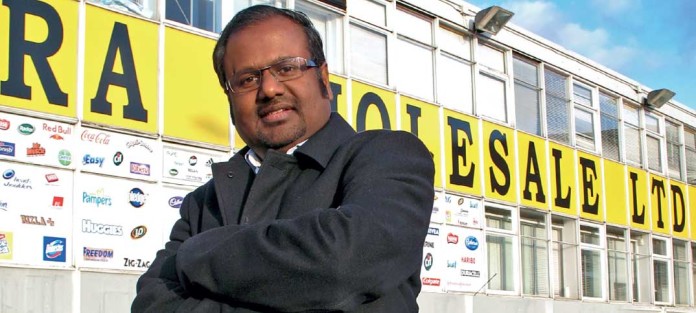Dee Thaya talks to Tan Parsons about how he brought a retail mindset to wholesale.
It’s a testament to Dee Thaya’s determination that in just over 10 years, he has grown Abra Wholesale to the brink of becoming a £50m business in one of London’s most competitive wholesaling districts. The Enfield-based company has grown turnover by 30% each of the past three years – and was ranked 85th in last year’s Sunday Times Virgin Fast Track 100 league table.
Fast facts
- 10,000 SKUs
- Depot size: 75,000 sq ft
- £48m predicted turnover for 2014/15
- 60 staff
- Buying group: Landmark Wholesale
- 30% growth for each of the past three years
- Best selling categories: Alcohol, soft drinks, toiletries
This remarkable story has been driven by Abra’s belated decision to start selling alcohol and tobacco.
The business began as a non-foods wholesaler, specialising in toiletries and household lines. But the considerable investment needed to buy alcohol and tobacco – as well as the increased security risk – put Thaya off these traditional cash & carry staples until 2013.
“When we brought in grocery, our customers wanted to do one-stop shopping,” he says. “So we started offering alcohol to our customers and then that started building up as well.”
By adding cigarettes and booze to the mix, the business has grown hugely. Thaya says this owes much to his previous career as a convenience retailer and understanding the mindset of his customers. Abra’s logo includes the slogan: ‘A friend to the independent retailer’.
“I’ve been a retailer and I know what they go through,” says Thaya. “This is why we listen to the retailers – we talk to our customers regularly and try to satisfy their demands.”
A great example of how Abra has responded to its customers’ demands is its offering retailers the option to buy tobacco in half outers – something typical north of Birmingham, but unusual in the south, he says.
“Since we started offering tobacco in sizes to suit our customers, retailers who used to come and visit us every three weeks started coming every day, some twice a day. We have become a convenient wholesaler for retailers. It helps retailers who don’t want to buy a whole outer because it takes longer to sell through and there are lots of shop break-ins in London.”
Abra’s strategy means retailers who buy smaller packs are at less risk if they suffer a raid. And instead of spending £1,200 buying 15 cigarette outers in a typical cash & carry, a customer can pick up all the brands they need at a fraction of the price.
“Because of this, people are driving several miles to buy from us.”
Spending time arranging and professionally repacking tobacco outers is laborious and time-consuming for staff. But doing some things differently is important when you have so much competition – there are between 15 and 20 wholesalers within five miles of Abra’s depot, including the likes of Booker and Bestway.
There is also the scourge of bootlegged alcohol to deal with. Thaya believes the Alcohol Wholesaler Registration Scheme beginning in October (see page 20) will help and that alcohol will grow as a profitable category in the future.
But starting from scratch as an alcohol wholesaler is tough, especially in London, which already has many specialists. Abra is now working with Landmark, which it joined last year, to build links with key suppliers.
“Martin Williams and his team have been very helpful for us – they are very passionate about building up their members and making them successful,” says Thaya.
“Without suppliers’ support and contribution, it’s very difficult to progress,” he adds. A good supplier-wholesaler relationship is “based around responding quickly” and keeping the wholesaler informed of
new products, new pricing and campaigns.
Before 2003, Thaya was a successful retailer with five stores mainly in north London. He got to the point where he was working “too many hours and too many days” so he sold the shops and decided to go into one larger business.
“The change from retail to wholesale is you are dealing with professional customers and they expect a level of professionalism when they come to visit you so we have to do whatever we need to,” he says.
“For example, we train our staff that the customer in front of you is more important than the customer on the other end of the phone.”
Thaya started in wholesale with a 10,000sq ft depot, and his range of toiletries and household goods attracted customers from as far afield as the Home Counties. He still maintains a wider range in this category than his immediate competitors.
Gradually, he upgraded the warehouse space and expanded the range to include confectionery and soft drinks.
In 2009, Thaya looked at export opportunities in west African countries, which mainly import goods from the UK. He travelled there to meet one potential customer and came away with 10 larger customers.
“That took us to the next stage,” he says. Abra’s export and cash & carry businesses are both doing well now.
Thaya bought the current, 75,000sq ft site in 2011 and the extra space enabled the business to take on grocery lines. He is planning to open a second, 50,000sq ft depot within an hour’s drive of Enfield.
While most of its customers still prefer cash & carry, Abra is looking to grow its delivered capacity, which accounts for 20% of business.
There are many challenges facing wholesalers, not least the major multiples moving into independent retailers’ territories. But Thaya is optimistic: “If you fight in the right way with the right tools, you can progress.”








